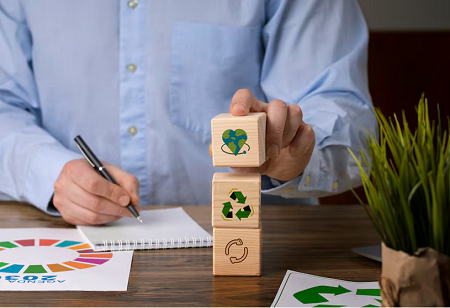
UAE Circular Economy Council’s policy makers held their meeting for the year 2023, chaired by Abdulla bin Touq Al Marri, Minister of Economy and Chairman of the UAE Circular Economy Council. The meeting reviewed progresses that have been made in terms of implementation of the objectives of the UAE Circular Economy Agenda 2031. The meeting also meant to strengthen the circular economy practices within the private sector. Many other such initiatives are being taken by governments across the world in order to promote circular business models and bring transformation in the manufacturing sector especially for the SME segment.
“The UAE is steadily moving towards a new economic model based on knowledge and innovation. The circular economy is one of its key pillars, with economic and development benefits consistent with the country’s strategies aimed at consolidating the UAE’s status as a global economic hub teeming with opportunities for growth and prosperity and doubling the GDP in the light of the ‘We the UAE 2031’ vision”, mentioned Bin Touq in the meeting.
Various circular economy strategies are gaining worldwide acceptance and we can also see MNCs in market research are also trying to come up with newer strategies that can help organizations in choosing the right strategies to undergo development.
Following Circular Economy Product Design Principles
It is difficult to make design changes in the product after manufacturing. This is why it is always advisable that organizations start implementing circular economy design principles from an ideation stage right from the point of procuring raw materials. Inputs should be provided to concerned departments at the time of material selection and deciding on the opportunities for design innovations that are fuelled by circular economy principles. Leaders must work closely with design teams in this regard and promote circular economy strategies. Raw material selection is necessary to achieve the desired outcomes and achieve organizational objectives.
To give an example, American retailer of outdoor recreation clothing company Patagonia has implemented many circular economy design strategies and has been successful as well. Patagonia's Worn Wear program encourages customers to repair and reuse their clothing rather than buying new items. They offer repair services, sell used clothing, and promote the idea of extending the lifespan of their products.
Drawing Consumer Engagement towards Circular Economy
Not many years ago, organizations depended on the consumer population regarding new discovery of products. It means that after consumer has used an item and found a possible way for disposal of it, he/she will go and buy a new product. By incorporation circular economy solutions, companies are leveraging a product-as-a-service model where they are providing maintenance and repairing services to expand the life-span of the product. A Gartner research shows that 40% of Supply Chain’s Top 25 organizations publicly outlined some of their approaches to improve customer engagement to drive circular economy outcomes.
In this regard, global commercial flooring company Interface. Inc is known for its commitment to sustainability and innovation and has successfully implemented several initiatives to involve consumers in the circular economy. Interface's ReEntry® 2.0 program allows customers to return old carpet tiles for recycling. This initiative not only diverts waste from landfills but also encourages customers to participate in the circular economy by returning used products for repurposing.
Establishing Strict Criteria for Circular Economy Partnerships
We are witnessing several cross industry collaborations for implementation of circular economy strategies. A circular economy change in the system relies heavily on collaboration of the involved stakeholders. We have also seen the emergence of many specialists in this domain who want to collaborate with organizations to make them achieve their circular economy goals. The primary idea behind these collaborations is only to scale up operations and leaders in the supply chain industry are being completely aware of that. They are implementing circular economy strategies considering the resources they require and the kind of return they expect from these business collaborations.
An American waste management company TerraCycle has successfully implemented such partnerships and taken the idea of circular economy to another level. It is a company focused on recycling hard-to-recycle waste and finding innovative solutions for waste management. They have developed various recycling programs for items such as cigarette butts, coffee capsules, and beauty product packaging, partnering with both large corporations and small businesses to collect and recycle these materials.
Many other aspects related to production and recycling of material are being undertaken by small businesses and large corporation worldwide in support of environmental sustainability and growth of circular economy. It can be hoped that the business ecosystem will witness more innovations in this sector in the years to come.
We use cookies to ensure you get the best experience on our website. Read more...